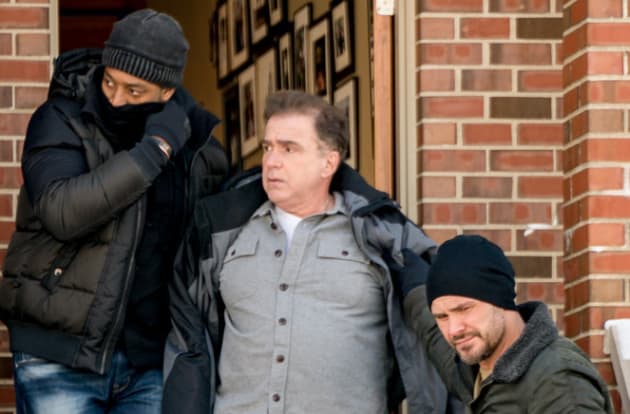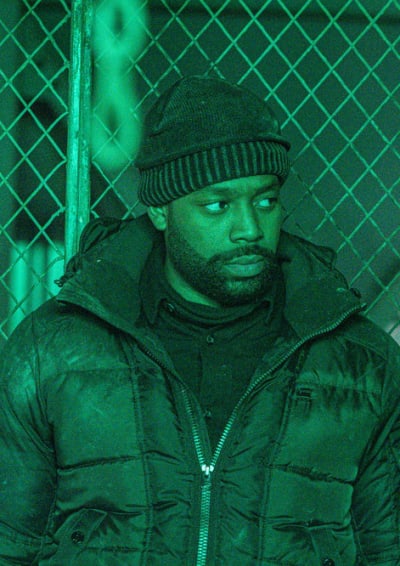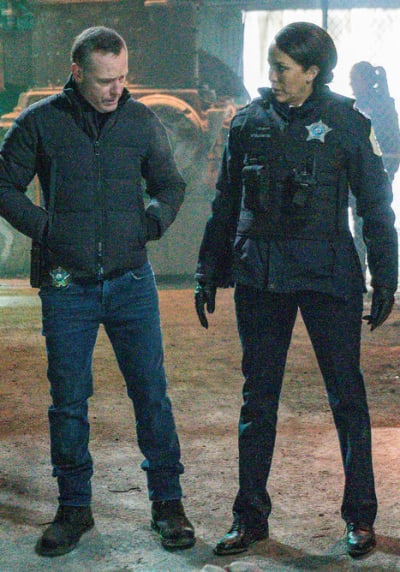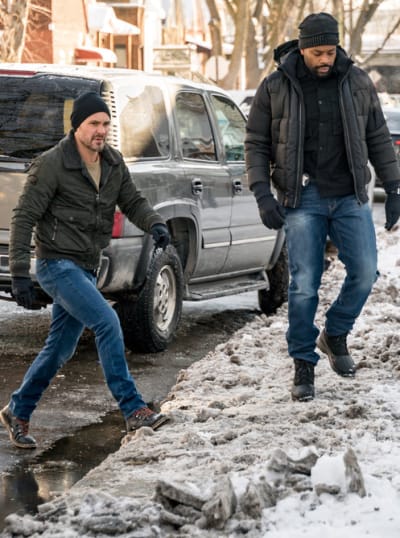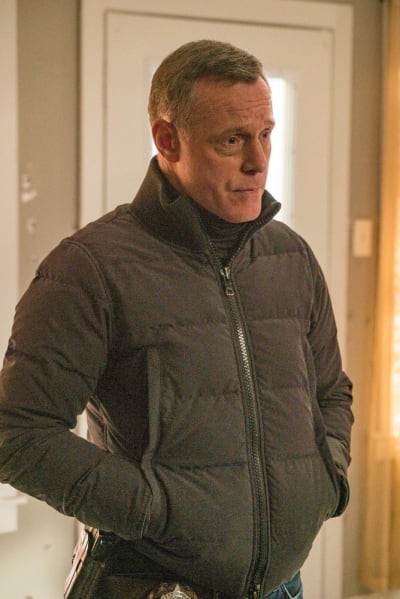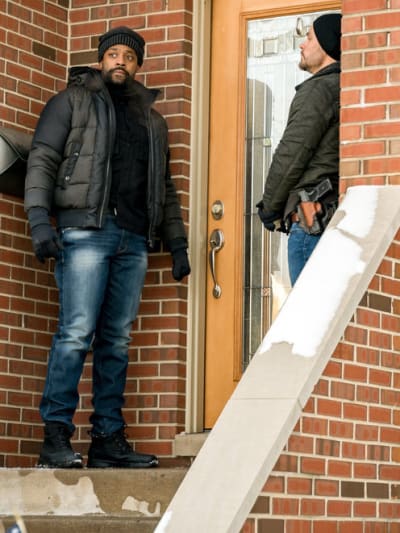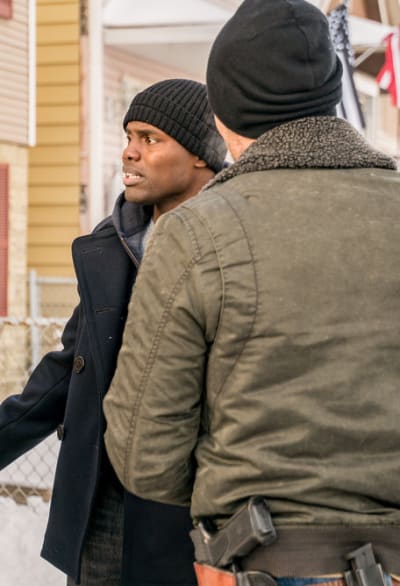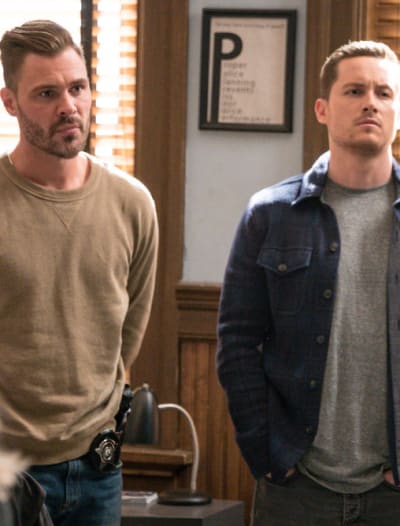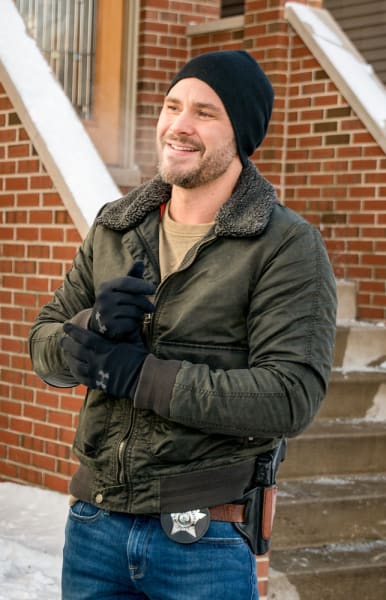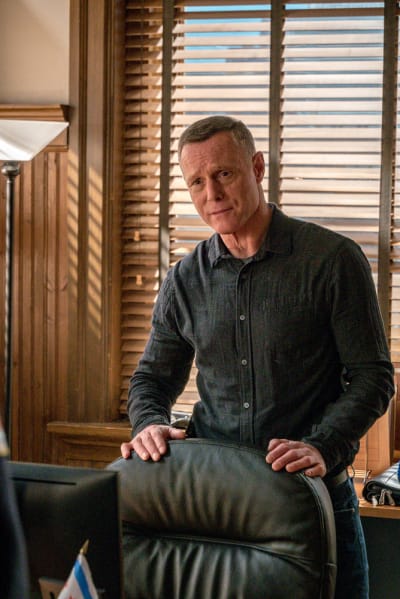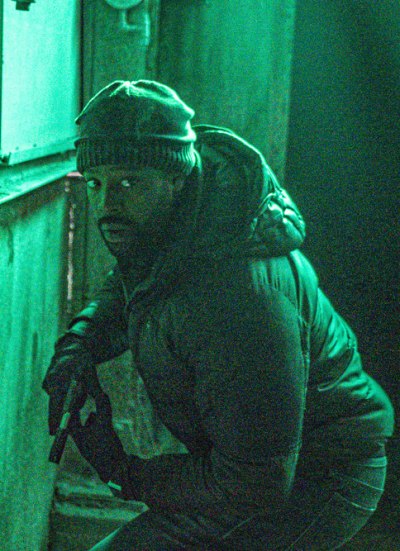This isn’t the first time a police reform storyline was at the forefront of an episode, but it did make for one of the most effective episodes.
The writers made some bold choices that paid off on Chicago PD Season 8 Episode 8.
Initially, it seemed like yet another instance where a white cop killed an innocent Black man, but the situation quickly evolved into something way more complex than that.
There was no question as to whether or not David Whelan was guilty. Anyone who watched the footage was very much aware that he was going down for murder.
Everyone except for Whelan, that is, who remained ignorant and stuck to his version that he was acting in self-defense for far too long.
I get the intention, it just, I don’t know, seems a bit overzealous, right? I’m just saying, you don’t punish the many to get to the few. Grill good cops looking for cops that ain’t there.
Ruzek
Despite his best efforts to convince everyone around him, including Ruzek and Atwater, his life was not in danger, and the shots were not justified.
There have been a few times — Chicago PD Season 8 Episode 7 comes to mind — where the series attempted to push a police brutality narrative where it didn’t exist. Still, in this scenario, it was clear that racial bias was at play.
Even before Whelan pulled Jeff Duncan over, he made up his mind about the man and feared for his life.
None of Duncan’s actions should have made Whelan feel scared or uncomfortable, aside from the fact that he was Black.
Duncan did everything right; He informed him he had a gun, and he held his hands up the entire time even as Whelan shouted for him to “put his hands up.”
And at no point did Duncan ever make a move to grab his gun.
But even if Duncan had been uncooperative, it didn’t warrant several bullets to the chest and being left to bleed out to death on the pavement. That’s what it didn’t warrant.
The idea behind implicit bias is that it affects a person’s understanding and behavior unconsciously, which explains why Whelan “thought” he saw Duncan reach for his weapon.
But now that there’s no question about what actually happened, we can dive into the episode, which found Ruzek and Atwater stuck with a job that absolutely no one wanted to do: arrest Duncan and transport him back to the station.
However, I’m not going to lie; I was thrilled to see these two work alongside each other once again.
It’s been a while since we’ve shaken up the partnerships on PD, and there’s never a dull moment when Atwater and Ruzek share the screen.
Since their friendship is the strongest in the series, their interactions allowed for some very distinct viewpoints that resulted in an informative and enlightening episode all-around.
Both Patrick Flueger and Laroyce Hawkins brought their A-game as they tackled complex topics in straight-up survival mode.
There was a bit of naivety on Voight’s part when he informed them they would be nothing more than an Uber.
Considering the recording was bound to go viral sooner than later, riots and protests were inevitable. Why wasn’t the force better prepared?
The very fact that Samantha Miller asked Voight’s team to handle this was a clear indication that she knew it was going to get out of hand.
Though, it is nice that Miller and Voight have established a level of trust between each other. When Voight informed her that he would let Atwater and Ruzek play this case the way they wanted it to, she didn’t object.
The moment Ruzek and Atwater arrested Duncan, their workday from hell started.
With death threats stacking up against him, they were ordered to take him to a safe house, which was quickly made.
They were forced to act swiftly and think on their feet since being with Duncan put them in a direct line of danger.
And throughout the whole time, they had to listen to Duncan try to justify his actions, which was outright aggravating.
However, it did lead to some important conversations that otherwise wouldn’t have happened if the trio weren’t stuck together in the first place.
The case drew similarity to George Floyd’s death in the U.S. this past summer, but it was interesting to dig into the police side of it.
We got three distinct perspectives from three very different cops.
Whelan maintained his innocence until Atwater forced him to rewatch the video, which is when he realized that the way he perceived and remembered the incident was not how it actually happened.
This is the first time we’ve actually seen a cop admit to making a mistake because he allowed bias to cloud his judgment.
Obviously, it didn’t make the situation better, nor did it bring back Duncan, but at least he didn’t die thinking he was on the right side of history.
He wasn’t the hero he thought he was, and that’s a hard truth to admit.
Of course, his death wasn’t sufficient punishment.
While it might not have been ideal for Atwater and Ruzek to put their lives in danger to protect a racist cop, their job is to protect and serve, even those who don’t deserve that protection.
The idea of keeping him safe ensured that he would be charged and pay the price for the crime he committed.
Killing him was the easy way out, which is why Atwater fought so hard to keep him alive. He wanted to see justice get served.
Ruzek: There’s something very wrong here… those shooters just made a safe house.
Atwater: What we gotta do is ask ourselves this question: was it an inside job? Only people that know about the safe house are CPD.
Ruzek: Not to mention they just beat patrol by two minutes.
But it’s hard to blame TJ, Duncan’s brother, for wanting to dole out justice himself. Even we’ve seen the corruption within the CPD on numerous occasions.
Atwater said it best: TJ and the Black community have lost empathy for the people that are supposed to protect them. They’ve seen the hatred, the corruption, and they’ve been let down by the system most of their lives.
While this could have been the first time the force did right by the victim, TJ was out for revenge, and Whelan realized that he wouldn’t survive a day in prison. Again, death was the easier option.
Atwater and Ruzek also engaged in an effective conversation that opened up a much-needed line of dialogue about a complex situation, which, in reality, shouldn’t be all that complex.
Atwater: We gotta stop hiding behind…
Ruzek: Behind what?
Atwater: Being white.
Ruzek: Being white? Really…
Atwater: You don’t gotta be Black to know wrong from right.
Ruzek: I never said that anything that man did was right. Did you hear me say that?
Atwater: Think about what this white man did and how the next Black kid is going to look at you next time you go out there.
While they both agreed that Whelan was guilty, they approached the situation very differently because of their own experiences.
They both made valid points and vocalized what both sides have been feeling and allowing to fester inside over the years.
There’s an easy solution on the surface – stop killing Black people, but changing a whole system isn’t as easy.
These conversations, while uncomfortable, are necessary.
Atwater’s anger is valid — he carries so much of it as a Black man and a cop. He’s constantly torn between these two parts of himself that he tries to reconcile.
He can’t be proud of being a cop because it seems like a betrayal of his people. It must be exhausting.
However, Ruzek also made some valid points. As a white cop, he’s lumped in with all the other racist cops and has to continuously defend himself despite not sharing any of those ideologies and beliefs.
He’s nothing like Whelan, but to the outside world, he may as well be.
Whelan: I’m not the criminal here.
Atwater: No? Who is? The 19-year-old Black kid you shot down?
Whelan: I defended myself.
Atwater: From a college student?
Whelan: I had the right to defend my life.
Atwater: From what?
Ruzek: Kev, don’t.
Atwater: No, from what? I just watched the video you told me to. You murdered a kid and you’re going to stand here in front of me and defend yourself?
Ruzek: Just let it go.
Atwater: Just let it go? He’s standing in front of you too.
Ruzek: All I’m saying is we might be here awhile. None of this is helping. All I’m saying.
On Chicago PD Season 8 Episode 7, we even saw Ruzek’s actions, which were completely justified, get questioned because of how the public perceived them. That’s bound to take a toll on a cop who is simply trying to do his job under some dire circumstances at times.
They both carry the burden in different ways.
These conversations seem more effective than the department’s attempt at early intervention to forecast future problems based on a series of questions.
While it’s great that they are trying to do something to thwart instances of police brutality, the truth of the matter is that the test was flawed.
It didn’t weed out the bad seeds in a field of good apples.
There’s a huge difference between asking someone how they would handle a situation while they are sitting in a room and actually seeing how they act in a life-threatening situation.
Both Ruzek and Atwater were deemed problematic. Ruzek’s dedication to the police force was flagged, as was Atwater’s lack of trust for fellow officers.
But Whelan — with his racist beliefs and undertones — passed with flying colors.
That’s all the proof you really need that while it’s a step in the right direction, it isn’t a sustainable solution.
Though I’ll admit, I enjoyed the opening scene that ping-ponged from each member of Intelligence as they were put on the spot.
It was an action-packed hour of television that proves that Chicago PD’s still got it when they embrace storylines that are authentic to the characters and their experiences.
Over to you, TV Fanatics. What did you think of the episode?
Did you enjoy the tension and camaraderie between Atwater and Ruzek? Did you find the case compelling?
Be sure to watch Chicago PD online and let us know your thoughts on the episode in the comments section below!
Lizzy Buczak is a staff writer for TV Fanatic. Follow her on Twitter and read her personal blog at CraveYouTV.
